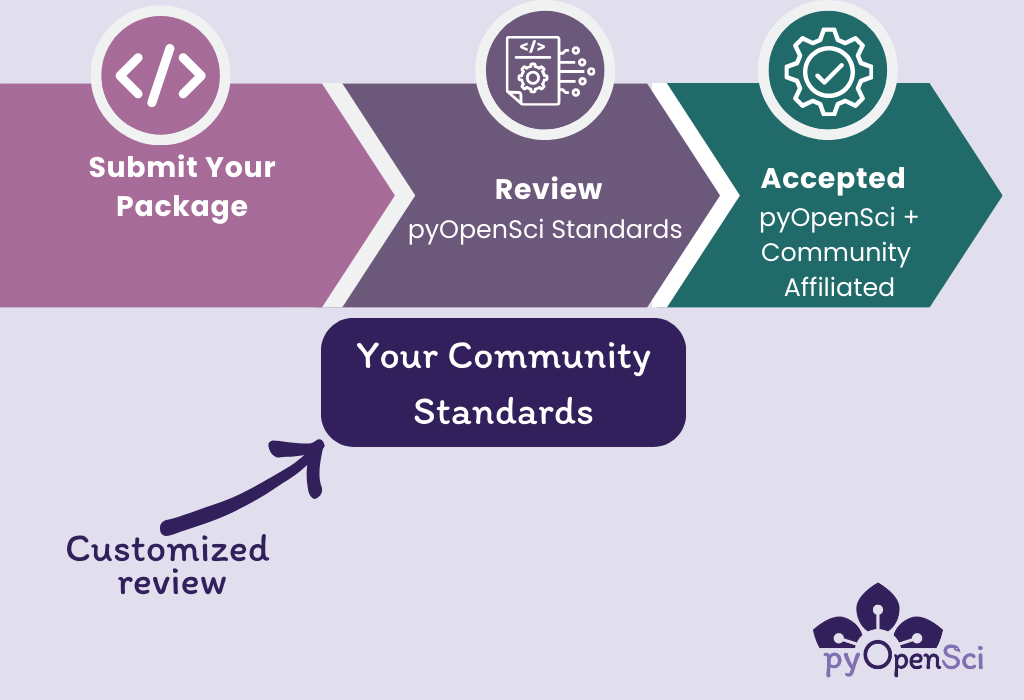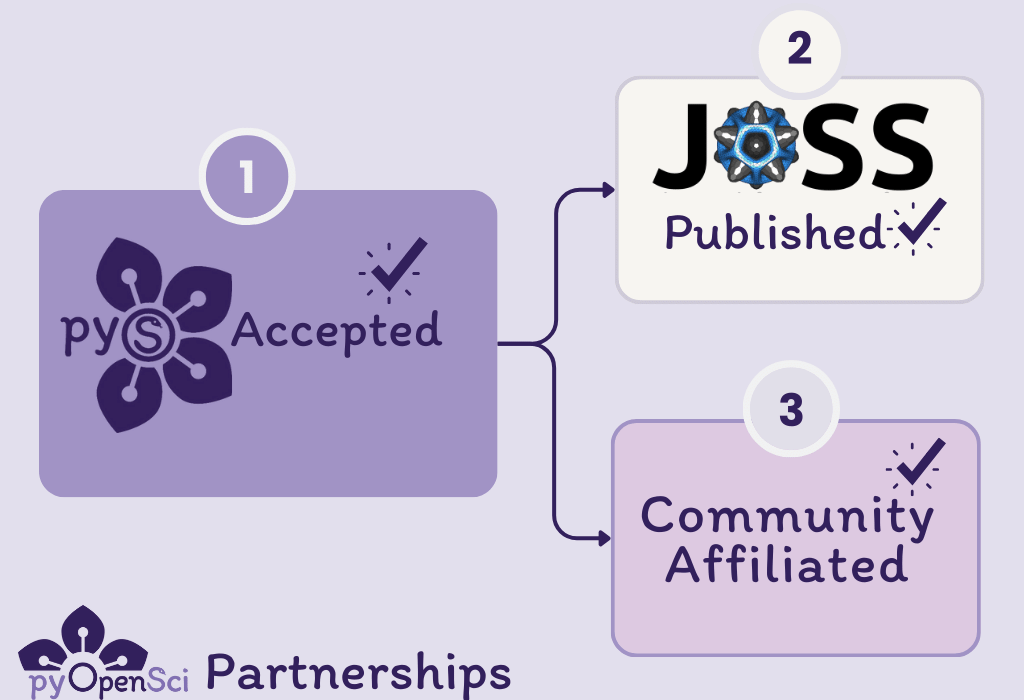Domain-specific communities can partner with PyOpenSci to leverage both our peer review process and development of Python packaging packaging guidelines.
Community Partnerships Streamline Peer Review & Packaging Standards
pyOpenSci adds an extra layer of community-specific review to our established open peer review process. This allows domain-specific scientific Python communities to vet affiliated tools through our robust peer review process. Communities then don’t have to develop and maintain their own review processes and software guidelines.
Benefits of partnering with us
Through a single review process, community maintainers:
- Have their package accepted into the pyOpenSci ecosystem
- Can be published in JOSS (if in scope)
- Can become an affiliated package with your community, following your community guidelines.
- Are supported in maintaining their tools, with input from our diverse, knowledgeable community, including active members from across the Python, Conda, PyPA and broader Python packaging ecosystem.
Partnering with pyOpenSci increases the visibility of your communities’ tools
We will:
- Promote your community and its packages on our website.
- Post about your affiliated packages on our social media channels.
- List your package on our packages page.
- Provide a feed allowing you to cross-list affiliated packages on your website.
- Keep in touch with maintainers to ensure packages are actively maintained.
Help scientists find the Python software tools that they need
Our catalog of vetted open source tools makes it easier for scientists to find the trusted tools that they need to develop their open science workflows.
Leverage our peer review process
Your science domain-specific community can take advantage of our existing, developed and well-documented peer review process which includes:
-
A growing team of editors from a diverse set of scientific and technical backgrounds. We ask partner communities to have at least 2 members of their community on our editorial team. We want our partner community to make the final decision on whether a package should receive the label of being affiliated. Typically an editor will run 2-4 reviews a year. Learn more about the editor role.
-
Community reviewers whose expertise spans numerous scientific domains. We ask that partner communities help us find reviews in their specific domain areas as packages come in for review. Learn more about the requirements for reviewers.
-
Community driven packaging resources and guidelines: Our packaging guidelines drive the peer review process. Instead of communities creating their own individual guidelines, pyOpenSci partners collaborate with us to expand packaging resources.”
Let's make packaging easier for scientists, together
Given the numerous diverse packaging options, many communities are crafting their own guidelines and review processes. Partnering with pyOpenSci enables your community to:
- tap into and contribute to an established community-owned set of packaging guidelines.
- mitigate the redundancy of multiple communities creating their own processes and standards.
Aligning packaging criteria supports increased consistency in packaging approaches across the Python ecosystem. This consistency will lower the barrier of entry for new potential contributors.
Harness the power of community
pyOpenSci is driven by a vibrant community of technical packaging experts, open science enthusiasts, and Pythonistas. When you partner with pyOpenSci, you:
- Become part of a community rich in expertise, ready to assist you with your packaging challenges.
- As a package grows, we help your community maintainers decide what to do if they need to step down from maintenance roles, be it finding a new maintainer or gracefully archiving the package for safekeeping.
Raising the bar for scientists developing Python software
More packages going through our review process means we’re all working together to raise the bar in terms of quality, documentation and usability of scientific software.
By reviewing packages from the entire ecosystem, pyOpenSci can identify redundancy in package functionality and areas where maintainers could benefit from consolidation efforts.
Why do so many domain specific Python communities exist?
Within the Python ecosystem, various science-domain-specific communities are creating peer review processes to evaluate community-affiliated tools.
- A response to the need to vet and maintain a list of high-quality tools that their communities embrace
- A need to track software maintenance to ensure ecosystem tools in their vetted lists are maintained
- The need for packaging guidance given a complex packaging ecosystem filled with numerous tools and options
However, creating a review process for software requires significant effort. pyOpenSci was created to target these exact issues in support of open science.
Astropy is most mature of the domain-specific communities that we work with, having built its peer review process in 2013.




